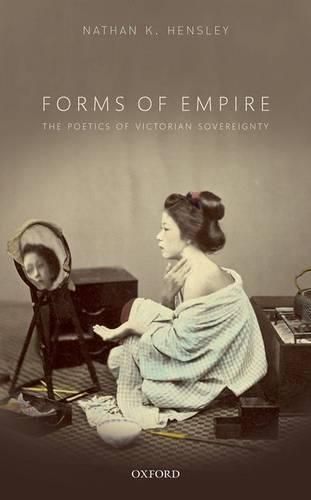Readings Newsletter
Become a Readings Member to make your shopping experience even easier.
Sign in or sign up for free!
You’re not far away from qualifying for FREE standard shipping within Australia
You’ve qualified for FREE standard shipping within Australia
The cart is loading…






In Forms of Empire, Nathan K. Hensley shows how the modern state’s anguished relationship to violence pushed writers to expand the capacities of literary form.
The Victorian era is often imagined as an age of equipoise, but the period between 1837 and 1901 included more than two hundred separate wars. What is the difference, though, between peace and war? Forms of Empire unpacks the seeming paradoxes of the Pax Britannica’s endless conflict, showing that the much vaunted equipoise of the nineteenth-century state depended on physical force to guarantee it. But the violence hidden in the shadows of all law –the violence of sovereign power itself–shuddered most visibly into being at the edges of law’s reach, in the Empire, where emergency was the rule and death perversely routinized.
This book follows some of the nineteenth century’s most astute literary thinkers–George Eliot, Charles Dickens, Wilkie Collins, A.C. Swinburne, H. Rider Haggard, and Robert Louis Stevenson among them–as they wrestled with the sometimes sickening interplay between order and force, and generated new formal techniques to account for fact that an Empire built on freedom had death coiled at its very heart. In contrast to the progressive idealism we have inherited from the Victorians, the writers at the core of Forms of Empire moved beyond embarrassment and denial in the face of modernity’s uncanny relation to killing. Instead they sought effects–free indirect discourse, lyric tension, and the idea of literary character itself–that might render thinkable the conceptual vertigoes of liberal violence. In the process, they touched up to the dark core of our post-Victorian modernity.
Drawing on archival work, literary analyses, and a theoretical framework that troubles the distinction between
historicist and formalist approaches, Forms of Empire links the Victorian period to the present and articulates a forceful vision of why literary thinking matters now.
$9.00 standard shipping within Australia
FREE standard shipping within Australia for orders over $100.00
Express & International shipping calculated at checkout
In Forms of Empire, Nathan K. Hensley shows how the modern state’s anguished relationship to violence pushed writers to expand the capacities of literary form.
The Victorian era is often imagined as an age of equipoise, but the period between 1837 and 1901 included more than two hundred separate wars. What is the difference, though, between peace and war? Forms of Empire unpacks the seeming paradoxes of the Pax Britannica’s endless conflict, showing that the much vaunted equipoise of the nineteenth-century state depended on physical force to guarantee it. But the violence hidden in the shadows of all law –the violence of sovereign power itself–shuddered most visibly into being at the edges of law’s reach, in the Empire, where emergency was the rule and death perversely routinized.
This book follows some of the nineteenth century’s most astute literary thinkers–George Eliot, Charles Dickens, Wilkie Collins, A.C. Swinburne, H. Rider Haggard, and Robert Louis Stevenson among them–as they wrestled with the sometimes sickening interplay between order and force, and generated new formal techniques to account for fact that an Empire built on freedom had death coiled at its very heart. In contrast to the progressive idealism we have inherited from the Victorians, the writers at the core of Forms of Empire moved beyond embarrassment and denial in the face of modernity’s uncanny relation to killing. Instead they sought effects–free indirect discourse, lyric tension, and the idea of literary character itself–that might render thinkable the conceptual vertigoes of liberal violence. In the process, they touched up to the dark core of our post-Victorian modernity.
Drawing on archival work, literary analyses, and a theoretical framework that troubles the distinction between
historicist and formalist approaches, Forms of Empire links the Victorian period to the present and articulates a forceful vision of why literary thinking matters now.